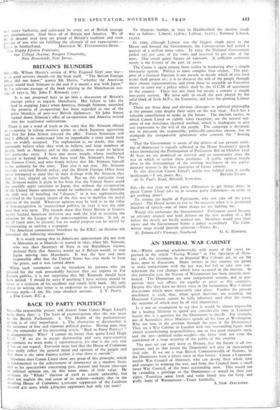BACK TO PARTY POLITICS ?
Six,—No responsible person will dissent from Canon Roger Lloyd's main thesis that: a. The basis of reconstruction after the war must be the British Parliament. 2. The Health of the parliamentary system is of vital importance. 3. The alternative to dictatorship is the existence of free and vigorous political parties. Having gone thus far, the remainder of his interesting article, " Back to Party Politics? " is disappointing. Why? I cannot do better than quote Lord Hugh Cecil: " If we are to escape dictatorship and save representative government we must make it representative, for that is the only title it has on our regard. Everyone must feel that the House of Commons does really reflect the general mind and opinion of the people and that there is the same balance within it that there is outside."
Nowhere does Canon Lloyd show any grasp of this principle, which is fundamental to the achievement of democracy in a modern State, and so his speculations concerning past, present and future cleavages of political opinion are, on this score alone, of little value. He criticises the " Khaki " election of 1918 as utterly unhealthy, but does not explain the real cause of its malaise—namely, that in the resulting House of Commons 5,101,000 supporters of the Coalition secured 472 seats, while 4,674,000 opponents had only I30 seats! To illustrate further, in 1922 in Huddersfield the election result was as follows: Liberal, 15,879 ; Labour, 55,673 ; National Liberal, 15,212.
In 5929, although Labour was the biggest single party in the House and formed the Government, the Conservatives had polled a quarter of a million more votes. In 1935, the National Government polled 531 per cent. of the votes and received 7o per cent. of the seats. One could quote figures ad nauseam. A sufficient comment surely is the history of the past 22 years.
The Canon is again remote from reality in hankering after a simple two-party system. Politics is more complex than cricket. The pur- pose of a General Election is not merely to decide which of two rival teams shall govern us ; it is to discover the will of the people through their chosen representatives, and from these to assemble an Executive sworn to carry out a policy which shall be the G.C.M. of agreement in the country. There has not been for nearly a century a simple two-party system. We have only to recall the part played by the solid block of Irish M.P.s, the Unionists, and later the growing Labour Party.
There are three deep and obvious cleavages in political philosophy at the present time despite their unity on the war issue. Each has a valuable contribution to make in the future. The election tactics, to which Canon Lloyd so rightly takes exception, are the natural out- come of our fortuitous electoral method, which is inadequate to give just expression to the will of the people. The campaign is designed, not to persuade the responsible, politically-conscious elector, but to stampede the irresponsible ignoramus who controls the " floating vote."
That the Government is aware of the defects of our present work- ing of democracy is vaguely reflected in the Home Secretary's speech when introducing the Prolongation of Parliament Bill on October 23rd. At least we arc promised an interval and an opportunity after the war in which to review these problems. A public opinion keenly alive to the shortcomings of the existing machinery of our parlia- mentary system is the best guarantee of future reforms.
In this direction Canon Lloyd's article was helpful even if totally
inadequate.—I am, yours, &c., BERTHA EVANS. 26 St. Paul's Road, Mirfield, Yorkshire.






































 Previous page
Previous page